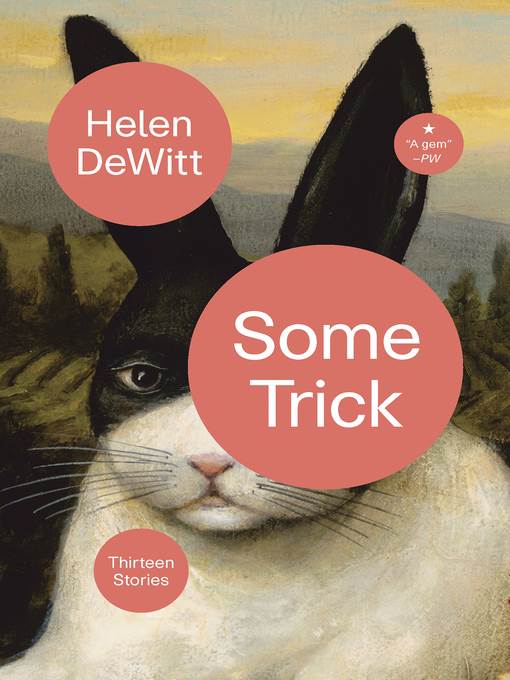
Some Trick
کتاب های مرتبط
- اطلاعات
- نقد و بررسی
- دیدگاه کاربران
نقد و بررسی

Starred review from March 5, 2018
DeWitt (The Last Samurai) reasserts herself as one of contemporary fiction’s greatest minds in this dazzling collection of stories about misunderstood genius. In “My Heart Belongs to Bertie,” a statistician flees from a lunch with his book agent, preferring instead an imagined conversation with a “robot, in which rationality carries no stigma.” Literary agents come under fire again in “Climbers,” about a group of Americans who seek to publish the work of a reclusive novelist. Heedless of the fact that he is a writer who “can feel his mind crackling” under social pressure, they secure an agent who decides his book may be “the next 2666.” The writer’s only response to the bombardment of emails that ensues is to close his laptop and go “off in search of a beer or maybe a Sachertorte.” The suffering of a brilliant mind is made most accessible by “Famous Last Words,” wherein DeWitt’s narrator glumly accepts the degeneration of a stimulating conversation about Barthes into a seduction that leaves her and her suitor “stripped of language, indifferent featherless bipeds.” DeWitt’s disdain for those who seek to profit off of genius is sharp and refreshing, and her ability to deliver such astounding prose and thought-provoking stories constitutes a minor miracle. This is a gem of a collection.

Starred review from March 1, 2018
Short works from the author of Lightning Rods (2011) and The Last Samurai (2000)."Many years ago a friend commented that we rarely see fiction that shows the way mathematicians think." Few authors would take this observation as a challenge, but few authors are like DeWitt. One of the distinguishing features of DeWitt's work is a sense of curiosity. She seems to find everything interesting, so she makes everything interesting. The story that springs from that friend's offhand remark is "My Heart Belongs to Bertie," the tale of a man who writes children's books that explain complex mathematical principles. The story contains charts mapping various probabilities, and if that sounds tedious, it is not, because DeWitt has crafted an utterly sympathetic character who would most definitely use charts. "Famous Last Words" includes equations that will probably be inscrutable to most readers, but the very fact that the equations are there tells us so much about the two people who inhabit this odd love story. Literary theory is deftly deployed. There are amusing and illuminating footnotes. Many of these pieces depict the backside or underside of creative work. DeWitt explores the impact of contractual obligations on music, for example, as well as the inner workings of the publishing industry as seen from a variety of viewpoints. Money is shown to be more important than we tend to like to think it is when it comes to art. DeWitt's wide-ranging intellect makes these stories, but it's her sense of humor and profound humanity that make them work. She approaches her weirdos and screw-ups with keen-eyed honesty but also with sincere affection. And the first story, "Brutto," has one of the most satisfying closing lines ever. This collection has many delights, but it's worth picking up just for that.DeWitt continues to explore the limits of storytelling with these slyly charming tales.
COPYRIGHT(2018) Kirkus Reviews, ALL RIGHTS RESERVED.

September 1, 2018
Like the geniuses, go-getters, and big thinkers who populate her stories, DeWitt (Lightning Rods) asks that readers "please, keep up." In this, DeWitt's first collection of short fiction, art vs. commerce is a recurring theme; some of the characters are artists who are (barely) trying to deal with commerce, while others are agents and editors (barely) trying to understand the artistic aspect of what they're trying to sell. Esoteric references abound, from qualitative design guru Edward Tufte to R, the open source statistical software, which is mentioned more than once. Robots (not robotics), Gaussian curves, Boswell, Hume, Barthes--it's heady and unpredictable stuff. While many of these stories are puzzling, DeWitt can be accessible when she wants to be. "On the Town" and "Climbers" both feature a self-effacing and charming man who succeeds effortlessly at anything he tries, while "Stolen Away" features a late-night poker game starring a couple of blokes straight out of a Martin Amis story. Ultimately, fans of David Foster Wallace will be at home, as these stories also share the absurdist streak of Nell Zink and George Saunders. DeWitt's wry sense of humor is evident throughout. VERDICT Erudite readers and fans of the unconventional will find much to love in this anthology, but readers expecting traditional narrative and plot structures may come away scratching their heads.--Stephen Schmidt, Greenwich Lib., CT
Copyright 2018 Library Journal, LLC Used with permission.

























دیدگاه کاربران